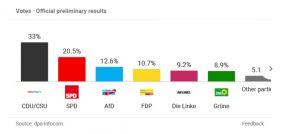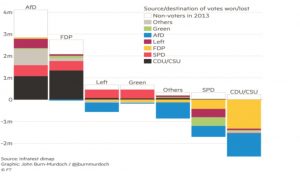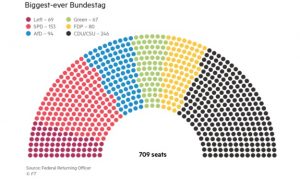Daily Comment (September 25, 2017)
by Bill O’Grady and Thomas Wash
[Posted: 9:30 AM EDT] It was a busy weekend. Here are the stories we are following:
Merkel slips: Merkel’s CDU/CSU won the election as expected, but underperformed expectations. Her party took 32.9% of the votes compared to the last poll predicting a result of 34%. However, most polls going into last week had her party at 36%, indicating a disappointing outcome.

The mainstream parties took a beating. The Social Democrats lost votes to all the fringe parties, while most of the Conservatives (CDU/CSU) lost to the Free Democrats (FDP), libertarian, and the Alliance for Germany (AfD), populist-right. Also note on the chart below that the AfD and the FDP took a large number of non-voters. Populists are pulling disaffected voters into the polling booths as they now believe they have a choice.

The SPD has indicated it won’t join a coalition with Merkel again so the Chancellor will need to put together a government with the FDP and the Greens (the so-called “Jamaica option,” reflecting the flag colors of that island nation).

Because of Germany’s proportional electoral system, the seats in the Bundestag are now up to 709, meaning that a majority government needs 355 seats. The CDU/CSU and the FDP only make up 326; the Greens are the only other coalition option for Merkel.
The fallout is that this will be a weak government. Although Merkel’s nuclear power policy and support of green energy will give her some credit with the Greens, the rest of the conservative coalition’s policies will be opposed by the Greens. The FDP generally opposes the Euro project which will undermine Merkel’s support because much of her own party is becoming increasingly Euro skeptical. Thus, governing is going to require all of Merkel’s formidable political skills. We would not expect a government to be officially formed until December.
The market impact is interesting. German Bunds rallied, helping U.S. Treasuries to lift. The EUR fell. The German elections show what we are seeing across the rest of the West. The center-left and center-right parties are losing support to the political extremes. Everywhere, voters are pressing for something new. We note over the weekend that the NYT carried a story about the growing strength of Jeremy Corbyn, who is dragging the British Labour Party to the extreme left.[1] The continued surge of both right- and left-wing populism is a threat to the stability of financial markets. In related U.K. news, Moody’s downgraded the U.K. to Aa2 from Aa1 due to Brexit and uncertainty about Britain’s debt reduction plans.
Japanese snap elections: Ending weeks of speculation, PM Abe will dissolve parliament on Thursday with elections mostly likely to be held on October 22. Current polling puts Abe’s LDP well in the lead, with 44% support from voters and most of the opposition parties holding under 10%. However, polls also report a high level of undecided voters, which carries its own dangers. Abe is calling for increased fiscal stimulus (a usual election ploy) and a hike in the consumption tax to 10% from 8%, with the additional funding for daycare in a bid to boost birthrates. We don’t expect Abe to lose but caution is warranted given the large number of election surprises over the past year.
Kurds vote: Iraqi Kurds are expected to vote to leave Iraq today. Although Kurdish leaders have indicated they will press for secession within 48 hours of a vote to leave, we actually expect a long and drawn-out process. Most of the Kurdish region’s neighbors oppose statehood and the Kurds themselves are bitterly divided between the more conservative Iraqi Kurds and the Marxist-leaning Kurds in Syria and Turkey. Still, this vote exemplifies a risk that President Bush ignored when he invaded Iraq 14 years ago; Iraq was more of a construct than a country and democracy would likely lead to division. Currently, Iraq is divided between Kurds, Sunnis who, for a time, flirted with IS, and Shiites, aligned with Iran.
Catalonia moves toward a referendum: PM Rajoy has declared the independence referendum, set for October 1, illegal and has arrested several Catalan independence leaders. Thousands protested in Catalonia over the weekend, calling for the vote to proceed. Rajoy probably overstepped by arresting leaders; polls suggest that support for independence is less than 50% and the referendum would likely fail on its own. The PM’s harsh tactics may lead to more support for independence than would have otherwise occurred.
[1] https://www.nytimes.com/2017/09/23/world/europe/jeremy-corbyn-labour-conference.html?emc=edit_mbe_20170925&nl=morning-briefing-europe&nlid=5677267&te=1


